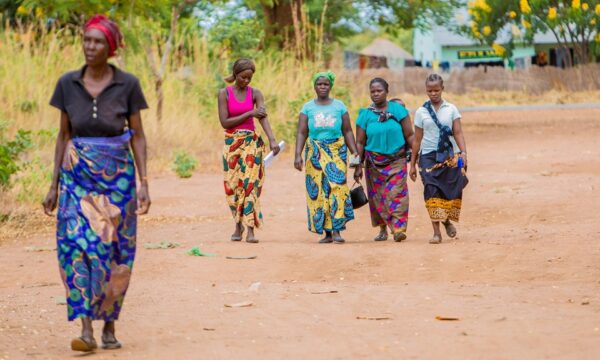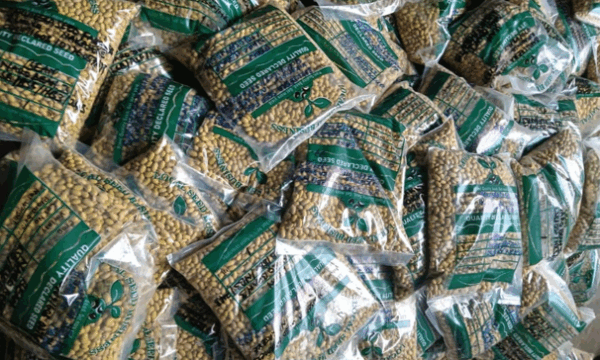At 42%, women form a large and important part of the global agricultural work force. In Ghana, this figure is even higher. Here, women make up 52% of the labour force and produce 70% of food crops. However, gender norms and stereotypes often prevent them from fully participating in decision-making on family farms. This impacts productivity.

Globally, a persistent and significant gap between men and women exists in access to education, power, resources and wealth, because of unequal gender relations. Closing this gap in farming can bring big benefits, not just for women, but also for the agricultural sector and society as a whole. Globally, if women had the same access to productive resources as men, they could increase yields on their farms by up to 30%. This could raise agricultural outputs by up to 4% and reduce the number of hungry people in the world by up 17%.
Helping women farmers to improve their productivity is vital for Ghana’s economy and food security. PlantwisePlus, in partnership with national authorities, has developed a gender handbook. This new resource equips agricultural extension agents with tools for gender sensitivity, ensuring equality, diversity and inclusion in agricultural activities. It was developed to accompany a large series of training exercises, which have been delivered to extension agents in several regions of the country.
Raising the productivity of women farmers in Ghana
Ghana is committed to gender equality and equity in the agriculture sector. The country has developed policy frameworks that support it at the national level. To this end, gender equality objectives have been included in Ghana’s Food and Agriculture Sector Development Policy. Furthermore, national targets for reaching women have been set for rural advisory services.
In 2023, CABI, through PlantwisePlus, developed the gender handbook for agricultural extension agents and rural advisory service providers in partnership with Ghana’s Ministry of Food and Agriculture. This handbook adds to Ghana’s ongoing gender equality efforts. It will help to improve gender equality in agricultural extension by providing a guide to staff about how to mainstream gender in their work.
Identifying women as farmers and clients of extension services

Despite their role in agriculture, women farmers in Ghana have less frequent access to extension services than men (9.5% of women compared to 34.4% of men). There are many reasons for this. Firstly, extension service providers often do not target women farmers. They target heads of households and landowners, who tend to be male. Secondly, there are too few women extension agents. A lack of female extension agents can affect women’s participation in agriculture. This is especially true in social contexts where meetings between women and men from outside the family are restricted.
Thirdly, non-inclusive approaches can impact the extent to which women can access extension services. These approaches do not consider, for example, the differences between rural women and men in terms of education levels, mobility and time availability. And finally, gender-based social norms hold women (and men) in socially accepted roles. The norms prevent women from breaking out of traditional care-giving responsibilities and into agricultural leadership.
Furthermore, when women do break free of gender norms, they are faced with the double burden of agricultural work and care-giving. This happens because the norms governing care responsibilities have not been properly addressed. This double workload burden exacerbates the existing gender inequality gap even further.
The handbook includes checklists and information to help extension agents identify women as farmers and therefore as clients of extension services. From gathering the names of women in households to observing the roles of men and women in communities, the handbook helps to identify the women who can benefit from extension support.
Addressing the constraints that women face
The handbook also includes checklists and information about how to address women’s mobility and time constraints. Insights into time constraints mean that advisory service meetings and visits can be arranged at times that work for both men and women.
Advice on communication techniques and tools has also been included in the handbook. This includes participatory approaches that can be used during training such as role play or even theatre. It can also include audio and visual aids such as posters and video clips. Working with a local interpreter and using local languages reinforces good communication.
Using inclusive approaches and ICT in extension delivery
Farmer field schools can help to deliver extension advice in a more experiential and participatory way. The handbook highlights how this is helpful for women who may lack literacy skills. It aims to equip farmers with hands-on, practical approaches to improve their productivity and livelihoods. Other participatory methods include farmers’ interest groups and self-help groups where farmers help other farmers.
ICTs are an important part of knowledge sharing. To mainstream gender through agricultural extension and ICTs, it is important to consider ICTs that are easily accessible and affordable to female farmers. The handbook focuses on how to develop gender-sensitive and targeted messages and ICT content. These should address the specific needs and constraints of women farmers.
Conducting gender analysis to understand the needs of farmers for agricultural extension services delivery
Gender analysis – the first step in gender mainstreaming – is central to agricultural extension and development initiatives. It is a tool for examining the differences between women and men, for example:
- the roles that women and men play
- the different levels of power they hold
- their different constraints, needs and opportunities, and
- the impact of these differences on their lives.
The handbook contains useful information on gender mainstreaming and handy templates such as rural women’s daily activity profiles and seasonal calendars. The templates can also be used to understand men’s activities. The comparison between women’s and men’s schedules and workloads can provide impactful insights in the gender gap. These tools help extension agents to understand the workload and schedules of women and men. This includes how they spend their time on different activities including unpaid care work, productive work, rest and leisure. This insight can help agents to advocate for infrastructure and services, such as childcare centres, to reduce and redistribute care work.
Supporting women farmer groups and engaging men and community leaders
The handbook also explains how extension agents can help to organize women farmer groups. These groups provide important benefits to women. They help to enhance women’s access to resources such as credit and land. They also help with technology dissemination and can boost job creation, market linkages and productivity. The handbook includes a section describing how to organize and support women farmer groups.
It also addresses how to engage with men and community leaders to support women’s participation in agricultural extension services. Community leaders are often male and often the first point of entry into a community. It is important to help leaders understand the benefits of supporting women in agricultural extension and rural advisory delivery. In this way, leaders can become agents of change. The handbook gives advice on how to engage with leadership and help women’s voices to be raised in communities.
Agriculture and women farmers are the backbone of Ghana’s economy
A complex array of individual and social factors influences the abilities of extension agents to deliver the knowledge they possess. This handbook was developed to increase their capacity to design and deliver gender-sensitive services. Women form a major part of the agricultural sector, and we must find ways to address their constraints, needs, and opportunities. In so doing, extension they can contribute to improved yields and incomes in the sector, improving the lives of their families, communities and beyond.

Read and download the handbook: Gender handbook: for agricultural extension agents and rural advisory service providers knowledge for life – Ghana edition.
Improving Ghanaian women farmers’ access to agricultural advisory services
“Let’s talk about it”: Championing gender dialogues in Ghana’s advisory services
Gender-sensitive rural advisory services in Ghana come under the spotlight in training workshop
PlantwisePlus gratefully acknowledges the financial support of the Directorate-General for International Cooperation (DGIS), Netherlands; European Commission Directorate General for International Partnerships (INTPA, EU); the Foreign, Commonwealth & Development Office (FCDO), United Kingdom; and the Swiss Agency for Development and Cooperation (SDC).
Infographics taken from the Gender Handbook. All media © CABI.
2 Comments
Leave a Reply
Related News & Blogs
Training Sri Lanka’s agro-dealers in pesticide risk reduction
Agro-dealers provide vital support to Sri Lanka’s farmers. These agricultural input suppliers are often the first point of contact for smallholders who need advice on plant protection products. However, agro-dealers often lack formal training in safer…
3 July 2025





This is one very useful document having utility for much of the developing world beyond Ghana.
Gender inclusivity and social cohesion is the best principle to ending gender disparities and stratification basing on “gender inequalities”
So it’s good to educate the public on the same;no gender is more better than the other. Great thanks